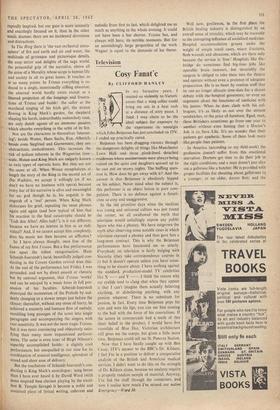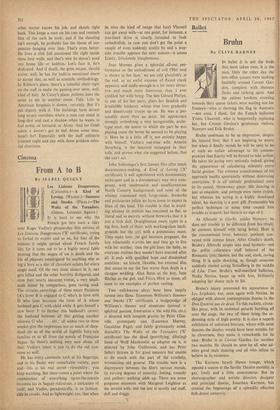Television
Cosy Fanat c
By CLIFFORD HANLEY
IN my formative years, I reacted so violently to Victori- anism that a wing collar could bring me out in a heat rash at a distance of •sixty paces. I think I may claim to be the ideal subject for exposure to A the experiment in nostalgia hich John Betjeman has just concluded on ITV. I ended up practically cured.
Betjeman has been dragging viewers through the-dangerous delights of things like Manchester Town Hall and those plush-lined detached residences where maidservants were always being ruined on the quiet and daughters queued up to be cast put on snowy nights. The baffling ques- tion is, How does he get away with it? And the answer is that Betjeman is absolutely hipped on his subject. Never mind what the subject is, this performer is an object lesson in pure com- pulsion. There is no defence against a fanati- cism so cosy and unaggressive.
In the old primitive days when the medium was young and universal culture was just round the corner, we all swallowed the myth that television would unfailingly expose any public figure who was a phoney. We have outgrown the myth after observing some notable cases in which television exposed a phoney and then gave him a long-term contract. This is why the Betjeman performances have fascinated me so utterly. Everybody on television is fairly bulging with Sincerity (they take correspondence courses in it) but it doesn't operate unless you have some- thing to be sincere about. I have nothing against the standard, production-model TV celebrities like X — and Y . I think the reason why my eyelids tend to clang shut when they appear is that I can't imagine them actually believing anything, or disbelieving anything, with any passion whatever. There is no substitute for passion, in fact. Every time Betjeman pops his eyes and wets his lips, you can see him coming to the boil with the force of his convictions. If the actors in commercials had a tenth of this sheer belief in the product, I would have five roomfuls of Blue Daz. Victorian architecture still gives me the creeps, but given a little more time, Betjeman could sell me St. Pancras Station.
Now that I have finally caught up with Ben Casey, ITV's answer to the BBC's Dr. Kildare, I feel I'm in a position to deliver a comparative analysis of the British and American medical services. I didn't want to do this on the strength of Dr. Kildare alone, because we analysts require a properly random sample of material. Anyway, I've fed the stuff through the computers, and now 1 realise how much I've missed our native Emergency—Ward 10. Well now, gentlemen, in the first place the British healing industry is distinguished by an overall sense of triviality, which may be traceable to the corrupting influence of socialised medicine. Hospital accommodation groans under the 'weight of simple tonsil cases, minor fractures, flesh wounds and abrasions, which are there only because the service is 'free.' Hospitals like Ox- bridge do sometimes find big-time jobs like operable brain tumours, but invariably the surgeon is obliged to take these into the theatre and operate without even a pretence of adequate preparation. He is so beset by routine stuff that he can no longer allocate time-slots for a decent debate with the-hospital governors; or even an argument about the functions of medicine with his junior. When he does clash with his col- leagues, it's as likely as not over the salmon sandwiches, or the price of furniture. Egad, man, these 'Britishers sometimes go from one year to another without even hinting that a Doctor's Job is to Save Life. It's no wonder that their patients get apathetic. Some of them look more like people than patients.
In America (according to my field-work) the profession doesn't suffer from this emotional starvation. Doctors get time to do their job in the right conditions, and a man doesn't just slice out a gallstone like a butcher. He is provided with proper facilities for shouting about gallstones to a younger, or an older, doctor first; and the other doctor knows his job, and shouts right back. This keeps a man on his toes and reminds him of the oath he took; and if the shouting isn't enough, he probably has the threat of sus- pension hanging over him. That's even better. He lives a rich full emotional life right inside these four walls, and that's why he doesn't need any home life or hobbies. Let's face it, he's dedicated. And if death, the grim reaper, should arrive, well, he has the built-in emotional sinew to accept that, as well as scientific methodology. In Kildare's place, there's a 'celestial choir right on the staff to make the passing-over seem, well, kind of holy. At Casey's place, patients have the sense to die in another room. Tidy. Life in American hospitals is slower, certainly. But it's got dignity with it. The buildings have decent long empty corridors where a man can stand in long-shot and cast a shadow when he wants to feel noble, or tortured, or Alone. And for Gosh sakes, a doctor's got to feel Alone some time, hasn't he? Especially with the staff cafeteria jammed night and day with those goddam celes- tial choristers.



































 Previous page
Previous page